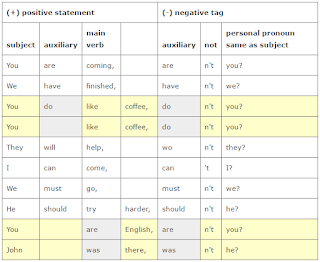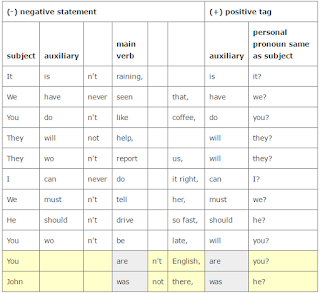Name : Aisyah Rizana Rahmah
NPM : 10213505
Class : 4EA18
3
Kinds Of Question
Question
Information (WH Question)
· Definition
A question in English to which an appropriate answer is to give
information rather than to answer "yes" or "no": typically
introduced by the word who, which, what, where, when, or how.
· Characteristic
a. Type
of questions to request information
b. Beginning
with question words (5W + 1H)
c. Ends with a
question mark
· When does it use or when are this question sentences used
The use of information question
is usually used by journalists, journalists, or other activities that are
critical. And in general the information question is used when someone wants to
get a lot of information from one person by asking using WH / Information
Question all information can be obtained. WH / Information questions can also
be used in writing essays and clippings and thesis contained in the formulation
of the problem.
· Pattern
In my opinion after i read various information about pattern of question
informations have using question words follow two basic patterns:
Question Word + Auxiliary + Subject
QW + Auxiliary + S
or
Question Word + Auxiliary + Subject + Verb + Adjective
QW + Auxiliary + S + V
· Example
a.
Question
Word + Auxiliary + Subject
Q
: Where is she?
A
: She's at the beach.
b. Question Word
+ Auxiliary + Subject + Verb + Adjective
Q : When do we
have class?
A : We have class
in the morning.
Question Word
+ Auxiliary + Subject + Verb
A : What do they
have?
Q : They have ice
cream
Yes / No Question (Closed Question)
· Definition
Yes or no
question are also called closed questions because there are only two possible
responses: yes or no.
· Characteristic
This
question sentence usually is forming by one of these verbs: be, do, have, or a
modal verb. It is impossible to ask a yes / no question without one of these
verbs.
· When Are Yes / No Questions Used
This
question sentences usually are used when someone want to ask about identity,
description of a person, place or thing, current activity or situation, past
activity or situation etc.
· Pattern and Example
There are
so much patterns for this question sentences with different condition. There
are:
Ø When
you want to ask yes / no questions about the identity or description of a
person, place or thing (Be + subject + adjective +?). Example: Am I your
friend?
Ø When
you want to ask yes / no questions about a present or past location (Be +
subjective + preposition + ?). Example: Are the keys under the books?
Ø When
you want to ask yes / no questions about a current activity or situation (Be +
Subject + (Verb + ing) + adjective + ?). Example: Am I going with you and Tom?
Ø When
you want to ask yes / no questions about a past activity or situation (Be (was
/ were) + subject + (Verb + ing) + ?). Example: Was it raining?
Ø When
you want to ask yes / no questions with passive voice (Be + Subject + V3 +
Adjective + ?). Example: Was the book read?
Ø When
you want to ask yes / no questions to somebody has done something or if some
action has taken place (Have / Has, Had + Subject + V3 + ?). Example: Has your
brother left?
Ø When
you want to ask yes / no questions in order to obtain facts about people,
places, or things (Do / Does, Did + Subject + V1 + ?). Example: Do they smoke?
Ø When
you want to ask yes / no questions about possibilities or uncertainties (Modals
+ subject + V1 + ?) (it depends with context that you want to ask). Example:
Can we stay?
Ø When
you want to ask yes / no questions with do or a modal verb (without to) (Do /
Does, Did, Modals + Subject + Adjective + ?). Example: Do you drink coffe?
Ø When
you want to ask yes / no questions iff there are two verbs that follow do, the
second verb remains in the infinitive (with to) (Do / Does, Did + Subject +
Verb1 + to + Verb1 + Adjective + ?). Example: Do you want to drink coffee?
Tag Question
· Definition
A tag
question is a special construction in English. It is a statement followed by a
mini-question.
· Characteristic
Tag
questions can be used to ask confirmation. They mean something like: “Is that
right?” or “Do you agree?” they are very common in English.
· When Are This Questions Tag Used
When
someone want to make sure or confirm about something with a single or minimal
question in a sentence.
·
Pattern
and Example
The
structures of tag questions are:
Ø
Positive statement tag questions. Look at these examples with positive statements. You will see that most off the time, the auxiliary verb from the positive statement is repeated in the tag and changed to negative.
Positive statement tag questions. Look at these examples with positive statements. You will see that most off the time, the auxiliary verb from the positive statement is repeated in the tag and changed to negative.
Ø Negative statement tag questions.
Look at these examples with negative statements. Notice that the negative verb
in the original statement is changed to positive in the tag.
Tag
question special cases with negative adverbs. The adverbs never, rarely,
seldom, hardly, barely and scarcely have a negative sense. Even though they may
be in a positive statement, the feeling of the statement is negative. We treat
statements with these words like negative statements, so the question tag is
normally positive. Look at these examples:
· Against Statement
|
There
is a bird, isn’t there?
|
|
|
There
are birds, aren’t there?
|
|
|
That
is a bird, isn’t that?
|
|
|
This
is a bird, isn’t it?
|
|
|
These
are birds, aren’t these?
|
|
|
Those
are birds, aren’t those?
|
|
|
It
is a bird, isn’t it?
|



I cannot thank Mr Benjamin service enough and letting people know how grateful I am for all the assistance that you and your team staff have provided and I look forward to recommending friends and family should they need financial advice or assistance @ 1,9% Rate for Business Loan .Via Contact : . 247officedept@gmail.com. WhatsApp...+ 19893943740. Keep up the great work.
BalasHapusThanks, Busarakham.